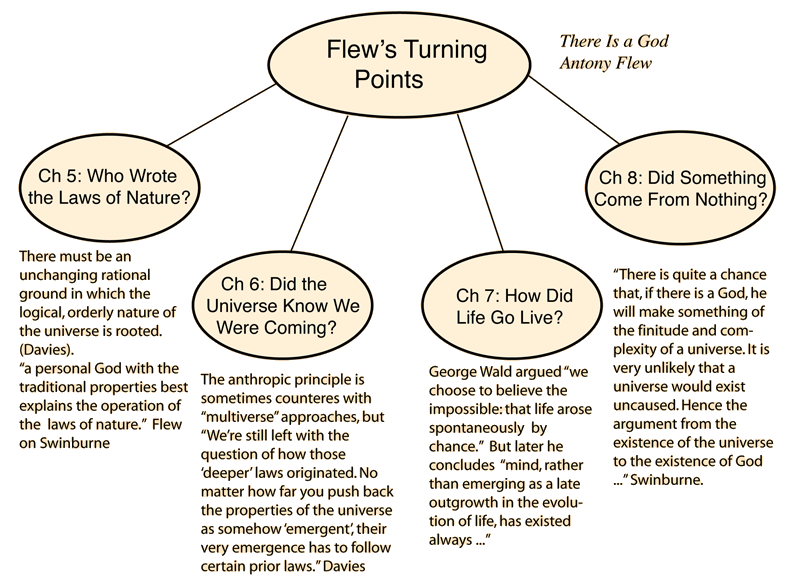There Is a God
How the world's most notorious atheist changed his mind.
Antony Flew and Roy Abraham Varghese
Chapter 1
Chapter 2
Chapter 3
p
p
p
p
II My Discovery of the Divine
Chapter 4 Pilgrimage of Reason
p85 Satellite phone on remote island parable.
p86 How we "let preconceived theories shape the way we view evidence instead of letting the evidence shape our theories." As examples "We should not ask for an explanation of how it is that the world exists; it is there and that's all.", "Since we cannot accept a transcendent source of life, we choose to believe the impossible: that life arose spontaneously by chance from matter." "The laws of physics are 'lawless laws' that arise from the void - end of discussion."
p88 Laying the Cards on the Table Describing his path to a belief that "the universe was brought into existence by an infinite Intelligence."
p88 "Science spotlights three dimensions of nature that point to God. The first is the fact that nature obeys laws. The second is the dimension of life, of intelligently organized and purpose-driven beings, which arose from matter. The third is the very existence of nature. "
p89 "my paradigm remains, as Plato in his Republic scripted his Socrates to insist" 'We must follow the argument wherever it leads.'"
p91 "The leaders of science over the last hundred years, along with some of today's most influential scientists, have built a philosophically compelling vision of a rational universe that sprang from a divine Mind."
p91 "Three domains of scientific inquiry ." "How did the laws of nature come to be? The second is evident to all: How did life as a phenomenon originate from nonlife? An the third is the problem that philosophers handed over to cosmologists: How did the universe, by which we mean all that is physical, come into existence?"
p92 Quotes David Conway, "The Recovery of Wisdom: From Here to Antiquity in Quest of Sophia"

Chapter 5 Who Wrote the Laws of Nature?
p95 Discusses the fact that he was formerly critical of arguments to design from order, but has come to the point that when correctly formulated, they are a persuasive case for the existence of God. He points particularly to the origin of the laws of nature and the origin of life and reproduction.
p96 Laws of nature and fact that they are "tied together" is, as Einstein spoke of them "reason incarnate".
p97 Quote of Hawking "mind of God" quote.
p98,99 Einstein quotes
p101 Einstein quotes on superior mind.
p103 Planck, Heisenberg, Shrodinger and Dirac, and even Darwin made statements pointing to God
p107 Paul Davies in his Templeton address
p108 John Barrow in his Templeton address
p110 Swinburne
Chapter 6 Did the Universe Know We Were Coming?
p113 Uses the parable of a hotel room on a vacation that mysteriously knows all about you and your needs and preferences - you would conclude that they had been tipped off.
p114 Freeman Dyson "The more I examine the universe and study the details of its architecture, the more evidence I find that the universe in some sense knew we were coming." "Disturbing the Universe", Harper & Row, 1979
p114 On anthropic principle, cites Martin Rees, John Barrow, and John Leslie as popularizers.
p116 John Leslie's list of 3 "fortunate" and also "fundamental" aspects of nature - if "fortunate" and also "fundamental" then they can be seen as evidence favoring belief in God.
p117 Martin Rees as multiverse advocate.
p118 Paul Davies and Richard Swinburne criticize the multiverse.
p119 Swinburne "It is crazy to postulate a trillion (causally unconnected) universes to explain the features of one universe, when postulating one entity (God) will do the job."
Chapter 7 How Did Life Go Live?
p131 George Wald argued “we choose to believe the impossible: that life arose spontaneously by chance.” But later he writes “How is it that, with so many other apparent options, we are in a universe that possesses just that peculiar nexus of properties that breeds life? It has occurred to me lately - I must confess with some shock at first to my scientific sensibilities - that both questions might be brought into some degree of congruence. This is with the assumption that mind, rather than emerging as a late outgrowth in the evolution of life, has existed always in the matrix, the source and condition of physical reality - that the stuff of which physical reality is constructed is mind stuff. It is mind that has composed a physical universe that breeds life, and so eventually evolves creatures that know and create: science- , art-, and technology-making creatures." George Wald, "Life and Mind in the Universe," in Cosmos, Bios, Theos, ed. Henry Margenau and Roy Abraham Varghese (La Salle, IL:Open Court, 1992), 218.
Chapter 8 Did Something Come From Nothing?
Chapter 9 Finding Space for God
Chapter 10 Open to Omnipotence
Appendix A: The "New Atheism: A Critical Appraisal of Dawkins, Dennett, Wolpert, Harris and Stenger, by Roy Abraham Varghese
Appendix B: The Self-Revelation of God in Human History: A Dialogue on Jesus with N. T. Wright.
p
p
p
p
p
p
p
p
p
p
p
p
p
p
p
p
p
p
p
p
p
p
p
p
p
p
p
p
p
p
p
p
p
p
p
p
p
p
p
p
p
p
p
p
p
p
p
p
p
p
p
p
p
p
p
p
p
p
p
p
p
p
p
p
p
| Reading Reference |
| Faithpath | R Nave |